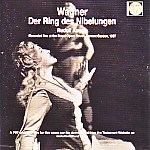Given that Testament has re-released its extraordinary, excellent-sounding 1955 Bayreuth Ring cycle as an attractively priced boxed set, it seems strange for the label to so quickly bring out yet another so-called “historic” Ring. This one preserves performances given at Covent Garden in the fall of 1957, conducted by Rudolf Kempe. Although Testament plays coy regarding the recordings’ provenance, they actually are BBC transmissions taken off the air by a home recording enthusiast (I gather the BBC master tapes don’t exist). The sound quality is not great, yet you easily can discern a realistic and listenable soundstage in which the voices, the orchestra, and venue congeal. The closing of Die Walküre’s second act best illustrates my point, where the rapidly changing on- and off-stage activity emerges in clear and tangible perspective.
Listeners familiar with this Ring via earlier, illegitimate incarnations are all too aware of the frequent radio static and crosstalk, to say nothing of tape wear and tear in the form of wow, flutter, drop outs, and pitch snags. Fortunately, Testament’s transfer guru Paul Bailey has considerably smoothed out, if not entirely eliminated, these problems. He’s even managed to tame that horrific barrage of static crackle at the start of Götterdämmerung’s Act 1 Scene 3 so that the voices now dominate, rather than the noise. Tape hiss is reduced, resulting in less brightness on top, but more bass and mid-range information.
Save for some less than stellar soft brass playing, plus inconsistent first desk work that ranges from wooden to reasonably expressive, the Covent Garden forces respond well to Kempe’s expertly paced and often inspired leadership. Knowing Kempe’s genius for evoking orchestral color, you could only imagine how the fiery Die Walküre Act 1 Prelude, Das Rheingold’s final pages, or the eloquently unfolding Siegfried’s Funeral March in Götterdämmerung Act 3 must have resonated in the flesh. The strong cast certainly helps.
Hans Hotter’s Wotan, Wolfgang Windgassen’s Siegfried, Hermann Uhde’s Gunther, and Ramon Vinay’s Siegmund stand out. It’s interesting to hear Birgit Nilsson’s Brünnhilde triumvirate prior to her peak international years. Her staggeringly secure vocalism and laser-like projection is all there, if not the lyrical tenderness and greater nuance she’d bring to her later recorded Rings.
As Mime, Peter Klein is inclined to emote and exaggerate in Das Rheingold, yet he appreciably tones down his act in time for Siegfried. Equally outstanding on both vocal and dramatic levels are Otakar Kraus’ Alberich and Georgine von Milinkovic’s Fricka; and if you’ve always wanted to hear Joan Sutherland on playful, agile form as Woglinde, here’s your chance (not to slight her Rheinmaiden colleagues Una Hale and Marjorie Thomas!). The 13 discs sell for the price of six, and you can download the librettos as PDF files from Testament’s website (www.testament.co.uk). Not essential, but possibly supplemental for specialist collectors and Wagner mavens.
































